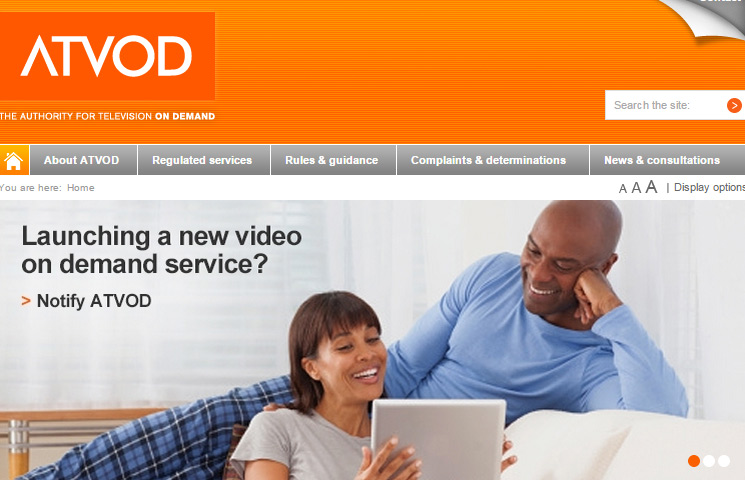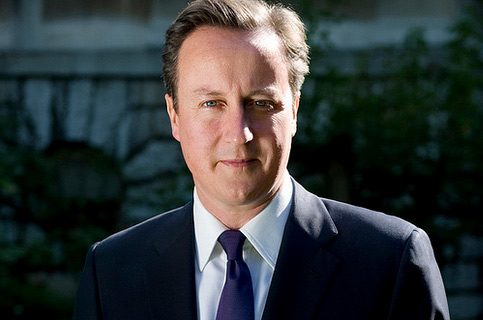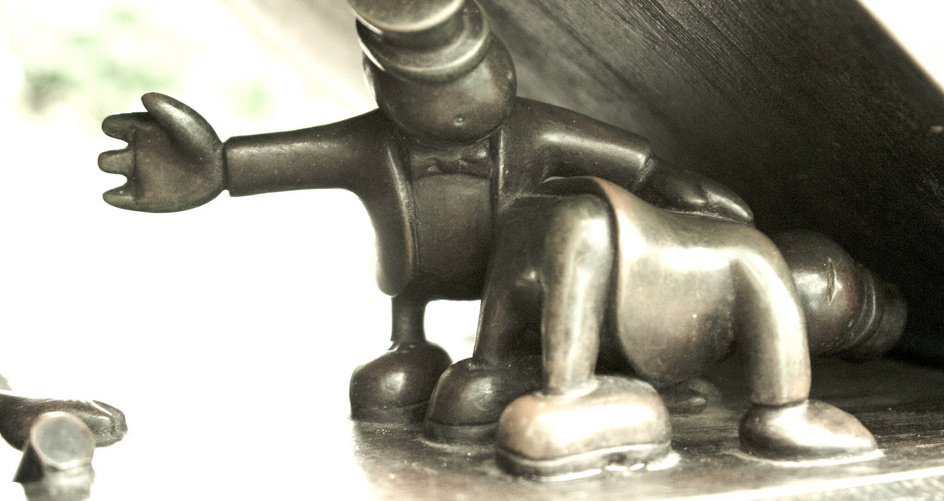If there's one thing the internet loves, it's a good ol' fashioned brawl. We take on all comers too, whether you're a piece of copyright legislation or a woman dumping a cat in a bin; we'll probably win too. You wouldn't imagine it, but there's a lot pluck in this game playing, social networking, meme factory, especially when it comes to things we love. Which is why it's so surprising that there's been little push-back on the British government's crackdown on what a lot of people consider the internet's main function: porn.
Pornography isn't something people give a lot of thought to of course, mostly because once they're finished looking at it they get on with something a bit more productive. But it's actually incredibly important. Being able to make it, view it and distribute it, is intrinsically linked with our freedoms of expressions and freedom to do what we want with our own bodies. Porn, both the consumption and construction, are very tightly linked to human rights.
And yet in the UK at least, those rights are being eroded. In recent years, obscenity has become the new scapegoat for many changes to the law which have gradually chipped away at the rights of individuals and businesses to view and produce pornography. It's now gotten to the point that on the 1st December, the Audiovisual Media Services Regulations 2014 came into play, which makes many sex acts illegal to film, including (but far from limited to) female ejaculation, spanking, and face sitting (more comprehensive list here).
If that seems ridiculous to you, you're not the only one. Fortunately it won't affect consumers, but it does make it illegal to make that sort of content, which essentially means if you're in the middle of it and flick a camera on, you're breaking the law.
Of course though, none of this is news to those have been campaigning in an attempt to halt this progression of restrictive legislation, like Sex and Censorship's Jerry Barnett. In the wake of this recent ATVOD law being passed, we reached out to him to discuss the current state of pornography legislation in the UK and how it impacts our freedoms and basic human rights.
“There's a message that goes throughout government and regulators, that British parents are irresponsible and are failing to protect their children, and therefore they need to do it for us,” he said, when asked about the new legislation.
As a father himself, understandably Mr Barnett finds this concept insulting. But he's in a unique position to look at the issue, having been involved in the porn industry himself for the best part of a decade. Beginning as a web consultant in the 90's, Mr Barnett began working with pornographers – who needed some of the most demanding websites in the early days of the internet – and eventually began his own site in the early 2000s, which ran until 2012.
“Over the last decade, sexual expression has come under heavy attack,” he said, highlighting the growth of tabloid and government sensationalism. One example he drew up involved so-called, “rape porn,” which David Cameron pledged to make illegal following a few weeks of “moral panic.”
This wasn't the first time Mr Cameron has gone after pornography of course, with a big push to ban “extreme porn,” involving any form of violence (simulated or otherwise) as well as any act which could be considered physically damaging.
Clearly, the governments and regulators draw a line between this and more mainstream porn. When I asked Mr Barnett where he would draw the line if in power, he said that there was only one line and that was between people who agreed to be filmed performing those acts and those who hadn't.
“There's a spectrum of pornography, but the only line to be drawn is between consent and non-consent,” he said. “As long as everyone on camera has agreed to what's going on, that's a very clear line. Organisations like ATVOD, OFCOM and the BBFC, are drawing lines in a completely arbitray manner.”

“Isnt' life better now we're being told what we can watch dear?
ATVOD is the group that has managed to push through the latest regulatory changes, giving itself much more power as the body that polices video on demand – though it recently extended its own (loose) definition to cover websites as well. It's reasoning for this latest crack down on pornography in the UK, is the same line that's toed by many groups that push to censor anything: ‘won't somebody think of the children.'
The specific power ATVOD has, derives from the EU's AVMS Directive, which states that: “if an on-demand programme service contains material which might seriously impair the physical, mental or moral development of persons under the age of eighteen, the material must be made available in a manner which secures that such persons will not normally see or hear it.”
The problem, as Mr Barnett points out, is that there isn't actually much evidence to suggest that sexually explicit material does harm minors. In-fact, OfCom itself conducted studies in 2005 and 2011, both of which concluded that there was no real evidence to support the idea that watching porn at a young age causes moral or emotional impairment. In-fact in the context of sexual violence, the opposite was actually found, where those who had viewed porn as a ‘minor' were less likely to commit sexual violence as they aged.
So OfCom, the government and ATVOD want to censor porn on the basis that it harms minors, when there is no real evidence to suggest that it does. Which makes you wonder what this big push for a porn crack down is really about.
“Sexual expression is the canary in the coal mine,” Barnett said. “This is a general campaign by ATVOD to try and take control of the internet, which has been ongoing for several years.
“What this does, is lay the groundwork for much stronger censorship,”he said. “It essentially criminalises content that is viewable without proof of age, which makes 99 per cent of porn sites in the world illegal as far as UK law goes.
“What this does is create an atmosphere for stronger censorship, so ATVOD can now go and lobby the government and say all these millions of sites break UK law, we need ways to attack them.”
If this is all sounding quite familiar, it's because it's almost identical to the way the government has handled complaints and lobbying from groups like the MPAA, BPI and RIAA when it comes to piracy. All of them have managed to secure block orders against torrent websites, regardless of how much legal content they host. That too is an infringement on freedom of speech and expression. It's censorship and here, ATVOD is trying to do the same.
“All of these groups would like some way to add a site to a block list much faster,” said Barnett. Whether that will come to pass remains to be seen, but he's convinced that in the mean time we'll see sites having their ability to advertise pulled and eventually, a black listing of their URL.

No word yet on whether having your own eSports team circumvents the rules…
Of course if you were of the cynical mind, this could all sound like a big conspiracy. Surely there aren't people actively trying to censor the internet through some obscure government body by making sure that no one can produce female ejaculation porn in the UK?
When I put this to Mr Barnett he agreed that there wasn't some Illuminati-like group behind it all, but suggested that that didn't make it any less dangerous.
“At the individual level it's people worried about a particular issue, but when you look at the bigger picture, there's certainly coordination between the grass roots groups that create a moral panic and regulators and people in government that pass laws,” he said. Adding, “There are absolutely people with a vested interest that know what they're doing.”
If all of this was about protecting children based around the moral standards of society, none of this new legislation would be required either. Since the 1850s, there's been the Obscene Publications Act, which makes it illegal to produce much of what the government considers “extreme” porn anyway. This law was refined in the 1950s to allow for a little more artistic expression (E.G. swearing in novels), but it has remained in place and allows the government to bring people forth on the charge of obscenity, leaving a jury to decide upon whether the person is guilty or not.
Except nowadays it's barely cited.
“The obscene publications act is used less and less now, because juries look at this stuff and don't judge it as obscene, making it very hard to get a prosecution,” said Barnett. “This is why the state has been introducing new laws which don't rely on a jury to decide, leading to more and more draconian censorship laws.”
All of this seems especially bizarre from a political stand point. Wasn't it just a few years ago that David Cameron was talking up the idea of a “big society,” with less government involvement. Apparently though, this is just business as usual for the Conservatives:
“Conservative party has always been an odd mix of pro-free market, liberal economics, but conservative moral attitudes,” said Barnett. “That's the strange coalition that the party has always been. Margaret Thatcher was a huge anti-porn advocate, but wanted the media to be deregulated.”

Cameron has repeatedly praised Chinese filters for their ability to block porn, despite the country's heavy censorship
Barnett doesn't seem to have any political allegiance however, as during our hour long chat he slammed most politicians, suggesting that the majorty of them were naive and bowed too easily to moral panic. Specifically, he said that Labour had lost most of its libertarian qualities. “Which is a shame,” he said, “because it led a lot of the sexual revolution of the 20th century: decriminalising homosexuality, abortion, contraception and that kind of thing. That element of the left appears to be dead and if anything, modern day Labour is more socially conservative than the right, which is a very strange situation to be in.”
When I asked him if there were any parties that could be held up as examples of pro-sexual freedom, he highlighted the Pirate Party UK as being very for evidence based policy in all respects. Unfortunately though, as he pointed out, it's support base is far too small to consider it able to enact much change in the short term.
What Mr Barnett did believe could and should change in the near future, was sexual education. That, according to him, was how we avert many of the “problems” people associate with pornography.
“We have some of the worst sex education in Europe. It's so backwards that instead of better educating children, we try and censor the internet,” he said. “I do agree that we should be wary of children learning all about sex from pornography, but if you let children get to puberty without teaching them about sex, then that's what's going to happen.”
Barnett would like to see age appropriate sex education start much earlier, perhaps taking cues from other countries around the world which have a much more liberal view of sex. He was also keen to see education based around consent and mutual pleasure.
“Children should absolutely be taught – in sexual education and otherwise – that you cannot do something to someone else without their consent.”

Other country's take it far more seriously. This is Argentina's giant ‘condom' to bring awareness to World Aids Day 2005
Whatever change we do make though, we need to take responsibility for our children's sexual attitudes and not blame pornography: “When kids hit puberty they become sexually interested and if they haven't been educated by then, then you haven't done a good job of parenting,” he said.
Of course this is the big crux of the argument, who's responsibility is it to manage young people's access to pornography? For Barnett, it's for the children's parents to handle.
“There are mechanisms to protect children and there always have been. ATVOD is very good at avoiding this issue: parental control software has been around for the better part of two decades, and it's getting better and is built into smartphones and tablets. If parents want to protect their children they can.
“For me personally, I don't feel it's necessary to implement parental controls on the machine of someone who's 14,15, but that's for parents to decide,” he added.
He went on to say that this is quite a common feeling among parents, with most giving their teenage children free reign on the internet.
“Parents aren't as scared of pornography as the newspapers and government tell them they should be and polls indicate that,” said Barnett. “Parents don't tend to block their teenagers' access,” he said, but pointed out that OfCom and other groups class those teens as children, which is why the regulators can make it sound like parents are being irresponsible and therefore recommend larger government oversight.
And it feels like such a shame, as in the government's red-mist of ‘protecting' the children, it's actually acting in a very sexist manner, which is likely to do more harm to the way people perceive women than pornography every could.
Along with banning female ejaculation (whilst leaving male ejaculation as totally above board) cracking down on the grass-roots adult film industry in the UK is essentially dampening female entrepreneurship.
“It's a fear of female sexuality,” Barnett continued. “I've met lots of women in porn and they are typically liberated, happy people. They are sexually liberated women and that sort of woman has always been hated. Most of the money in the industry goes to women and the sex industry as a whole has always largely been controlled by women, which is by and large the case today, especially with the internet.”
“If you look at webcams,” he said, “there's no middle man. That's self employed women connecting directly with the customer.”
Contrary to many people's perceptions of women in porn as victims, Barnett believes it's one of the most female empowering industries out there, even pointing to a Feminist Porn conference held in Toronto each year called FPCon.
Ultimately, Barnett sees ATVOD and the government's recent actions as a misguided but deliberate crackdown on female independence.
“Throughout history there have been swings against female nudity,” he said. “There's a recurrent idea that female flesh is dangerous and insights men to do bad things.
“In the past they would have said female sexuality brings the devil into your heart, whereas today they would describe it as objectification. It's just a more modernised form of non-evidence based arguments.”

It doesn't matter, they're both equally illegal in British porn
Too conclude our chat, I asked Mr Barnett what he would like to see in the future. While the one closest to us seems a bit bleak on the censorship front, does he have hope for something better?
“Culturally, we need to establish that bigotry against sexual women is as bad as any form of prejudice,” he said. “Racism, sexism etc. Slut shaming is just incredibly common and acceptable and that needs to stop. Women should be allowed to be sexual beings if they want to.
“From a legal point of view, there's loads that could be done though. We have a whole raft of stupid laws we don't need. In the long term, I'd like to see a first-ammendment type law, which would actually protect free expression in the UK. As it stands, it's always in favour of censorship and that needs to change. It should be illegal to censor unless you can come up with a good argument for it.”
He closed on a warning however, stating: “This anti-porn panic is going beyond that and becoming a generalised witch hunt which goes far beyond sexual expression, targeting page 3 and the banning of offensive speech on university campuses.
“Porn is just one piece in the [censorship] jigsaw.”
I'd like to thank Jerry Barnett, head of Sex and Censorship UK, for chatting with me. You can read some of his own commentary on censorship one his official blog, Facebook and Twitter. Look out for his book, Porn Panic, soon.
If you'd like to help Mr Barnett achieve his goal of reversing British censorship, you can get in touch with your MP and ask them to stand against legislation like the AMSR. There's also an online petition that you can sign, asking David Cameron to remove restrictions for on-demand porn.
KitGuru Says: Porn has been at the forefront of our society's freedoms for decades. Larry Flynt, the founder of Hustler famously took a bullet for those freedoms. We should at least email our MP about it.
Image source: Wikimedia, Richard Shatzberger
 KitGuru KitGuru.net – Tech News | Hardware News | Hardware Reviews | IOS | Mobile | Gaming | Graphics Cards
KitGuru KitGuru.net – Tech News | Hardware News | Hardware Reviews | IOS | Mobile | Gaming | Graphics Cards




While I certainly would not go with the argumentum ad absurdium that porn is at the forefront of our freedom of expression, I certainly wouldn’t go around banning people from it. (I admit, I’m trying to cure myself of an addiction to it, and helping people to stop DOESN’T involve catch all bans that could be used like a whip on things that are only superficially similar).
It’s one thing to be against it, it’s another to actively pursue universal, long-reaching bans. And even then, these people will just find workarounds.
I fail to see what the point of this is… “To protect children” yet it’s still okay to consume it as long as it was made outside the UK? That doesn’t actually solve anything, it only hurts your own country’s production and force the public to ‘import’ (economics)…
So no, this is just more political brownie points that old folk are trying to win against other slightly older folk who have no idea how the internet works or why…
When will we get politicians born in the age of internet, so we can finally have some common sense applied?
…and the NEW porn genre made-up by Camoron. “Maso-Sadism”
“While I certainly would not go with the argumentum ad absurdium that porn is at the forefront of our freedom of Expression”
I question that too!
I believe you have to be 21 to become an MP, which would assume that they would have been born around 1990 and able to convince everyone (included people more likely to vote) that you’d be a great fit for office.